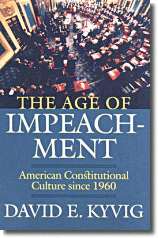 David Kyvig is Distinguished Research Professor in the Department of History at Northern Illinois University and author or editor of ten other books, including Explicit and Authentic Acts: Amending the U.S. Constitution, 1776–1995, winner of the 1997 Bancroft Prize.
David Kyvig is Distinguished Research Professor in the Department of History at Northern Illinois University and author or editor of ten other books, including Explicit and Authentic Acts: Amending the U.S. Constitution, 1776–1995, winner of the 1997 Bancroft Prize.He applied the “Page 99 Test” to his latest book, The Age of Impeachment: American Constitutional Culture Since 1960, and reported the following:
This book examines the surge in the use of impeachment that began with the 1961 John Birch Society campaign to impeach Chief Justice Earl Warren and has since produced as many serious impeachment efforts as had been seen in the previous 171 years of U.S. history. In its detailed narratives of thirteen executive and judicial impeachment attempts, including those involving Richard Nixon, Spiro Agnew, Ronald Reagan, Bill Clinton, George W. Bush, three Supreme Court Justices, and five federal judges, the book explores the increasingly toxic political culture of which impeachment was both cause and result. Page 99 reflects the book’s recurring demonstration of the connections between various impeachment episodes as well as their implications. The page falls in the middle of a chapter discussing the effort of Republican House minority leader Gerald Ford and the Nixon administration to achieve the impeachment of longtime Supreme Court Justice William O. Douglas.Read more about The Age of Impeachment at the University of Kansas Press website, and learn more about David Kyvig's research and publications at his faculty webpage.
In part, page 99 reads:
The Nixon administration proved eager to make public its willingness to assist in the investigation of Douglas after earlier surreptitiously providing FBI files to Ford. In sharp contrast to his response later when his own conduct was under investigation, the president announced that the administration would make every effort to provide all the information it could on the justice. Nixon himself wrote to Celler,
The power of impeachment is, of course, solely entrusted by the Constitution to the House of Representatives. However, the executive branch is clearly obligated both by precedent and by the necessity of the House of Representatives having all the facts before reaching its decision, to supply relevant information to the legislative branch, as it does in aid of other inquiries being conduct by committees of the Congress, to the extent compatible with the public interest.
Celler asked the president for access to tax returns for Douglas and Parvin, as well as the latter’s foundation and corporation returns. Nixon promptly agreed to provide them. Douglas himself estimated that forty federal agents devoted the equivalent of fifteen man-years to the investigation and turned over hundreds of documents to the House judiciary subcommittee.
The assault by Ford and the White House had the reverse of its intended effect of pushing Douglas to resign to avoid impeachment. The justice, who had undergone three operations in the previous year, including the installation of a heart pacemaker, had been contemplating retirement at the end of the Court’s term. But the Fortas experience affected his decision. “I’m not resigning,” he told his staff. “That would look too much like a confession of guilt, and I’m not guilty of anything.”
--Marshal Zeringue



